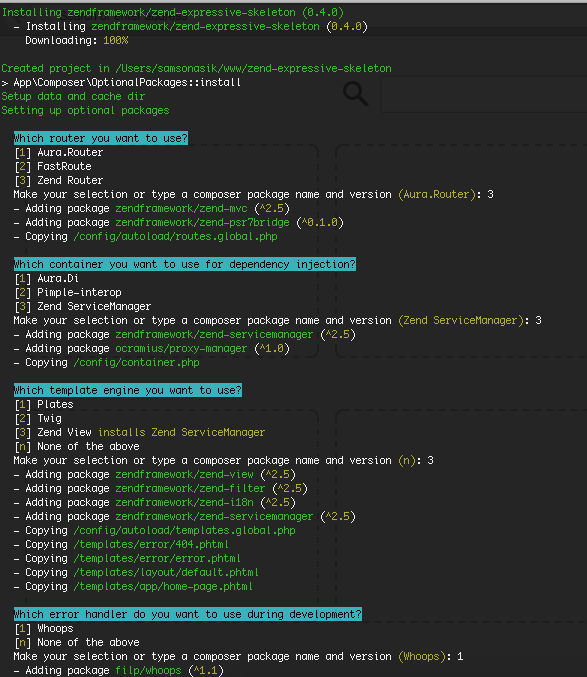10 Years of Zend Framework
Original Architecture
- Components
- Bound together by an MVC
Evolution of v1
- Forms
- Layouts
Zend_Application- Dojo, jQuery integration
Revolution: ZF2
- Event-driven architecture
- Dependency injection
- First class modules
… at a cost
- Complete break in compatibility.
- Targeting expert developers == less inviting
- Components depend on integration provided by MVC
layer
Composer

FIG
Framework Interop Group
PSR-7
Every framework abstracts HTTP differently.
Let's standardize that.
Frameworks must change
The job of a framework is to provide plumbing, and get out of your
way.
ZF3 Goals
- Componentization and re-use
- Performance
- Usability
- Focus on PSR-7 and middleware
Components
All components are now versioned separately.
(Full story at bit.ly/zf2-split)
Standardized Package Structure
- PSR-4 structure for source and tests.
- Documentation per package
(in progress)
- Standard QA toolchain; per-package continuous integration.
ZF2 Package
The zendframework package now simply depends on components.
{
"require": {
"zendframework/zend-authentication": "^2.5",
"zendframework/zend-cache": "^2.5",
"zendframework/zend-captcha": "^2.5",
"etc": "*"
}
}
Back to Basics
ZF3 will reduce dependencies
to only what's needed for the MVC.
Use Composer to add what you need.
Service Manager
- container-interop
- Consistent interfaces.
- Re-use factories for multiple named services.
- Immutable.
- Performant (4X faster)!
- Mostly backwards compatible!
New method: build
public function build($name, array $options = null)
For when you need a factory; think plugins
FactoryInterface
public function __invoke(
ContainerInterface $container,
$requestedName,
array $options = null
)
Forward Compatibility
Write your current factories as invokables.
public function __invoke(
ContainerInterface $container
)
EventManager
- 4X–15x performance based on use case!
- BC breaks:
- Removed argument overloading for
trigger().
- Aggregate attachment is moved to aggregate implementations.
Triggers
trigger($eventName, $target = null, $argv = []);
triggerUntil(callable $callback, $eventName, $target = null, $argv = []);
triggerEvent(EventInterface $event);
triggerEventUntil(callable $callback, EventInterface $event);
Aggregates
Before:
$events->attach($aggregate);
$events->attachAggregate($aggregate);
$aggregate->attach($events);
After:
$aggregate->attach($events);
MVC
- Updated to changes in zend-servicemanager.
- Updated to changes in zend-eventmanager.
- Essentially stays the same.
- But adds a
MiddlewareListener.
Routing to Middleware
'oauth' => [
'type' => 'Literal',
'options' => [
'route' => '/oauth',
'defaults' => [
'middleware' => OAuthMiddleware::class,
],
],
],
MVC Availability
4–6 weeks!
Enough with the boring stuff
Time to Reflect
Where is the PHP community headed?
Composer
FIG
Creating shared interfaces.
Users can target abstractions, not implementations.
PSR-7
HTTP Message Interfaces
Providing a common HTTP abstraction to program against.
Middleware

Middleware Signatures
function (ServerRequestInterface $request) : ResponseInterface
function (
ServerRequestInterface $request,
ResponseInterface $response
) : ResponseInterface
function (
ServerRequestInterface $request,
ResponseInterface $response,
callable $next
) : ResponseInterface
container-interop
interface ContainerInterface
{
public function has($serviceName);
public function get($serviceName);
}
Takeaways
Frameworks should be an implementation detail
Frameworks should be a commodity
Frameworks should get out of the way of your code
Expressive
PSR-7 middleware microframework
- Provides and consumes a routing interface.
- Pulls matched middleware from a
ContainerInterface.
- Provides a templating interface, if you need it.
- Provides error handling, and a way to hook into
it.
In action:

Expressive
Wiring together commodity components.
ZF3 is a Movement
An end to framework silos.


